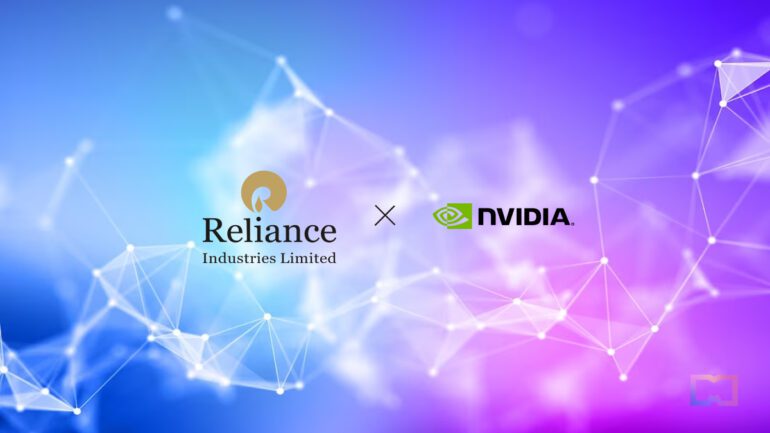TL;DR:
- Reliance Industries and Nvidia are collaborating on developing a localized, powerful language model for India.
- Their partnership aims to create an AI infrastructure significantly more potent than India’s current fastest supercomputer.
- This initiative will provide accelerated computing access to a diverse range of stakeholders in India.
- Nvidia will supply Jio with advanced AI supercomputer solutions and frameworks.
- Jio will manage the AI cloud infrastructure and customer interactions.
- The collaboration positions Reliance as a key player in India’s tech landscape.
- Nvidia is also partnering with Tata Group to train TCS employees in AI and bolster AI infrastructure.
Main AI News:
In a groundbreaking collaboration, Reliance Industries’s Jio Platforms has joined forces with GPU powerhouse Nvidia to spearhead the development of a substantial language model finely tuned to India’s diverse linguistic tapestry. This strategic alliance marks a pivotal moment as the largest corporate entity in India embarks on a foray into the burgeoning yet largely uncontested domain of localized AI.
Together, these formidable companies will forge an AI infrastructure that promises to eclipse India’s current fastest supercomputer by an astonishing order of magnitude, although no specific timeline for this ambitious endeavor has been disclosed. Reliance’s vision extends beyond this remarkable feat; they envision this cloud infrastructure providing accelerated computing access to a broad spectrum of stakeholders, including researchers, developers, startups, scientists, and AI experts throughout India.
Under the terms of this pivotal agreement, Nvidia will furnish Jio with an extensive suite of AI supercomputer solutions, featuring the formidable Nvidia GH200 Grace Hopper Superchip and the cutting-edge Nvidia DGX Cloud. These offerings will be complemented by advanced AI model frameworks. In reciprocation, Jio will assume responsibility for the administration of the AI cloud infrastructure and will be the primary conduit for customer interactions and access.
Nvidia’s CEO, Jensen Huang, expressed his enthusiasm for the partnership, highlighting India’s vast scale, data resources, and abundant talent pool. Huang emphasized the significance of deploying advanced AI computing infrastructure within India, empowering Reliance to develop its own formidable language models, thereby fueling the growth of indigenous generative AI applications.
Notably, while India boasts the world’s largest population, its presence in the global AI arena has remained comparatively subdued. Most Indian enterprises, both fledgling startups and established conglomerates, have predominantly focused on leveraging large language models crafted by entities such as OpenAI. Meanwhile, entities worldwide are engaged in a frenzied pursuit of Nvidia chips to bolster their endeavors in the realm of large language models.
Reliance, renowned for its robust oil business, has diversified its portfolio significantly over the past decade. Its expansion into sectors like telecommunications and video streaming has been particularly noteworthy. Jio Platforms, backed by industry giants Meta, Google, Qualcomm, and Intel, is progressively establishing itself as a pivotal technology distribution partner for global heavyweights. Its enduring partnership with Microsoft for cloud data centers and business offerings, along with the recent deepening of ties with Netflix, exemplifies its commitment to technological advancement.
Mukesh Ambani, Chairman and Managing Director of Reliance Industries, underscored the transformative potential of this partnership, envisioning it as a catalyst for India’s digital evolution, akin to the role played by Jio in the nation’s digital transformation. This ambitious collaboration is poised to create technology supercenters, heralding an era of widespread and accelerated growth in India’s tech landscape.
In parallel, Nvidia has inked a separate agreement with India’s Tata Group. This venture aims to equip 600,000 employees at Tata Consultancy Services (TCS) with advanced AI proficiency and bolster AI infrastructure in conjunction with Tata Communications.
Critics point to a skills gap within India’s workforce as a key factor hindering the emergence of AI-centric startups. The rapid evolution of generative AI could potentially disrupt many service-oriented roles, prompting analysts to caution that the time for action is now.
Conclusion:
The strategic partnership between Reliance Industries and Nvidia represents a significant advancement in India’s AI market. By developing localized AI capabilities and a potent infrastructure, they are poised to strengthen India’s position in the global AI arena. This collaboration underscores Reliance’s commitment to diversification and technological innovation, positioning them as a formidable player in India’s tech landscape. Nvidia’s parallel venture with Tata Group further signifies the growing importance of AI in India’s business landscape, as companies seek to equip their workforce with advanced AI skills and infrastructure.

